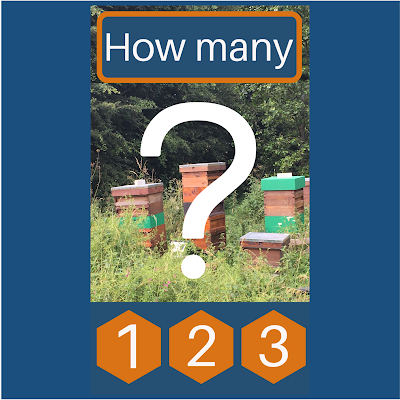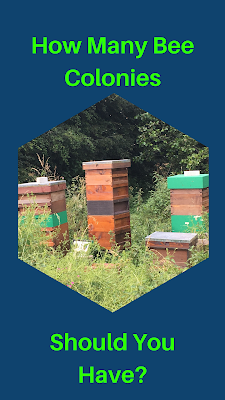Most beekeeping courses recommend that a keeper has a minimum of two hives at the end of their first season. There are a number of reasons for this:
Maintaining a single colony of bees has a number of disadvantages:
- You are not able to compare the performance, build up, brood pattern, honey gathering ability, of one colony with another. You will never really know if your bees are struggling if it is due to their genetics, the environment (forage availability or poisoning from pesticide even).
- Two or more colonies enables the beekeeper to run the apiary as one unit, taking frames of brood or eggs from colony and giving them to another. This may be to enable the second colony to raise a new queen for themselves in the event of them loosing their previous colony. A colony can find themselves queen-less if after swarming the virgin fails to return to the hive, being taken by a bird, insect or just getting lost.
- Some small but otherwise healthy colonies often will benefit from a donation of sealed brood in the spring just to get them 'over critical mass' after which they build up well. The donating colony, by loosing a frame of sealed brood is usually held back slightly, this may delay the onset of early swarming thus also potentially benefiting the keeper.
- Most beekeeping books and courses teach us to rear our own new queens from our best. If we only have one, we don't have a choice.
- Around 10% of UK colonies die out for one reason or another in the winter. If your single colony falls into this group your beekeeping will be over for a few months at least. If this happens to a new beekeeper for no reason of theirs it might as it often does put them off from continuing.
- Re-queening an aggressive colony requires the removal of the old queen and all subsequent queen cells and then the introduction of either another queen or young larva sourced from stock with a better temperament: from one of your other colonies!
Keeping more than one colony, I found, increased my confidence. For example when marking my first and only queen I was accutely aware that if I should damge her I would be in big trouble! It took three attempts to get her marked. Once I had more queens the pressure is off. Also the number of inspections that you carry out each week will increase: you will learn faster! And you won't be tempted to open your single colony too many times "just to have a look" as many new beekeepers do.
So how many hives should you start off with?
Many would quite reasonably think one hive would be adequate for a hobby beekeeper, most suburban gardens and spouses would accommodate/tolerate a single hive.
So how many hives should you start off with?
Many would quite reasonably think one hive would be adequate for a hobby beekeeper, most suburban gardens and spouses would accommodate/tolerate a single hive.
But, we should all have some spare equipment (nuc boxes or spare hives) for swarm management. These can be relatively cheap poly nuc boxes or second hand (a bit tatty but clean) hives can be picked up at sale or auction days organised by many associations. So why not put a colony into one or more of these?
Two colonies I would say is the absolute minimum, two full size colonies with a nucleus colony (so three) would be ideal. Four is probably the limit.
Can you have too many? Undoubtedly yes! Too many colonies when starting out will mean that inspections will become a chore and will probably be missed
There is not necessarily any reason to actually buy another colony (it might though, be a good idea to purchase from two or more suppliers for comparative purposes). Raising a queen or two of your own is easily achievable and, for most beekeepers occurs as a result of swarm control manipulations by default.
Taking the queen out from a colony that is preparing to swarm, placing her on a frame of sealed brood, with a frame of stores and comb or foundation in a nuc doesn't take a great deal of work at all. The original colony has the resources to raise a new queen (or indeed more than one if required) and you now have two (or more) colonies. Any excess colonies can be reunited later in the year or better still, over winter them and if in the following spring they are surplus to your needs, sell them or give them to another beekeeper!
I mentored a new beekeeper a few years ago. He helped me out in my apiary and took a nuc from me. These did well in the first year giving him a reasonable crop of honey and feeding themselves for the winter.
I had suggested on a number of occasions that he increase his colony numbers and each time he had replied that yes he knew all the reasons why it'd be better to have two or three colonies but he was happy just to have the one.....
One day the following year I had a call from him: He'd been away on holiday and hadn't checked his bees before he went and now they'd swarmed! What should he do?
We decided to split his double brood box colony into two, plus a nuc. Leaving one queen cell, brood and bees in each part.
A little after two weeks later I had another call from him. He had no queens, no brood, no eggs, he was distraught!
As it turned out the following day when I called round he did have eggs, brood and a new queen in two of the three splits. He told me then that although he had always known why he should've had more than one colony he now understood why he should have more than one colony!
He was really lucky, managing to keep two strong colonies going into winter. He now mentors new beekeepers himself. I have no doubt that he advises that they too have more than one colony!
Good luck to all those setting off on their beekeeping journey this year.
I mentored a new beekeeper a few years ago. He helped me out in my apiary and took a nuc from me. These did well in the first year giving him a reasonable crop of honey and feeding themselves for the winter.
I had suggested on a number of occasions that he increase his colony numbers and each time he had replied that yes he knew all the reasons why it'd be better to have two or three colonies but he was happy just to have the one.....
One day the following year I had a call from him: He'd been away on holiday and hadn't checked his bees before he went and now they'd swarmed! What should he do?
We decided to split his double brood box colony into two, plus a nuc. Leaving one queen cell, brood and bees in each part.
A little after two weeks later I had another call from him. He had no queens, no brood, no eggs, he was distraught!
As it turned out the following day when I called round he did have eggs, brood and a new queen in two of the three splits. He told me then that although he had always known why he should've had more than one colony he now understood why he should have more than one colony!
He was really lucky, managing to keep two strong colonies going into winter. He now mentors new beekeepers himself. I have no doubt that he advises that they too have more than one colony!
Good luck to all those setting off on their beekeeping journey this year.


No comments:
Post a Comment